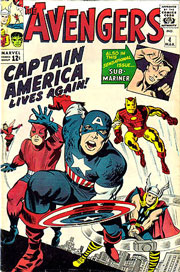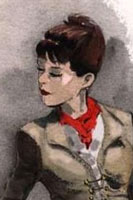
If you’re into American comics at all, you undoubtedly know how Stan Lee, Jack Kirby, Steve Ditko and others changed the industry with their work in the 1960s, and set the template for kinds of stories Marvel still publishes today.
That’s just part of the story that Sean Howe researched for his 2012 book Marvel Comics: The Untold Story. Through interviews, research of media reports, and of course tons of comics reading, Howe uncovered the backgrounds of many comics stories and rumors that longtime readers may have wondered about. There’s plenty of intra-creator acrimony to be found in its pages, yet Howe found that the book helped some of those involved to move on from decades-old wounds.
This week Tim talks to Sean Howe about the research, the reaction, and what this book has to say to aspiring creators.
Podcast: Play in new window | Download


 Tim came back from his Tim Across America trip with an assortment of comics, including a couple from the
Tim came back from his Tim Across America trip with an assortment of comics, including a couple from the  Chris Ware’s 2012 work Building Stories attracted a lot of attention because of its unusual format: a box of 14 publications of varying shapes and sizes, which can be read in any order. Ware says the work is about memory, in various ways, and reading the story in various non-chronological ways can give us different points of view on how its characters remember (or mis-remember, or forget) various things.
Chris Ware’s 2012 work Building Stories attracted a lot of attention because of its unusual format: a box of 14 publications of varying shapes and sizes, which can be read in any order. Ware says the work is about memory, in various ways, and reading the story in various non-chronological ways can give us different points of view on how its characters remember (or mis-remember, or forget) various things.

 Nearly three months ago, way back before “Tim Across America,” Kumar and Dana discussed Alan Moore and Eddie Campbell’s classic graphic novel “From Hell.” Now they’re back with a discussion of last year’s From Hell Companion, which includes an annotated script and a lot of other behind-the-scenes information, inspiring our guys’ repeated forehead slaps and exclamations of “How come I never noticed THAT bit of symbolism before?”
Nearly three months ago, way back before “Tim Across America,” Kumar and Dana discussed Alan Moore and Eddie Campbell’s classic graphic novel “From Hell.” Now they’re back with a discussion of last year’s From Hell Companion, which includes an annotated script and a lot of other behind-the-scenes information, inspiring our guys’ repeated forehead slaps and exclamations of “How come I never noticed THAT bit of symbolism before?” In a special bonus episode, we check out a few remaining tidbits from Tim Across America’s final state, California!
In a special bonus episode, we check out a few remaining tidbits from Tim Across America’s final state, California!



 Tim Across America, part nine! When it comes to Big Two comics these days, there’s a lot to complain about. Marvel characters changed to look like the actors who play them in movies; nearly the entire DC line subsumed into a grim-and-gritty muck. And yet… we still like some of these books! Superior Spider-man, anyone?
Tim Across America, part nine! When it comes to Big Two comics these days, there’s a lot to complain about. Marvel characters changed to look like the actors who play them in movies; nearly the entire DC line subsumed into a grim-and-gritty muck. And yet… we still like some of these books! Superior Spider-man, anyone?